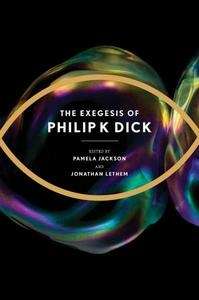Exegesis of Philip K. Dick

Editorial Gollancz
Fecha de edición noviembre 2011
Idioma inglés
EAN 9780575132443
944 páginas
Libro
encuadernado en tapa dura
Resumen del libro
"'A great and calamitous sequence of arguments with the universe: poignant, terrifying, ludicrous, and brilliant. The Exegesis is the sort of book associated with legends and madmen, but Dick wasn't a legend and he wasn't mad. He lived among us, and was a genius.'--Jonathan Lethem. Based on thousands of pages of typed and handwritten notes, journal entries, letters, and story sketches, The Exegesis of Philip K. Dick is the magnificent and imaginative final work of an author who dedicated his life to questioning the nature of reality and perception, the malleability of space and time, and the relationship between the human and the divine. Edited and introduced by Pamela Jackson and Jonathan Lethem, this will be the definitive presentation of Dick's brilliant, and epic, final work. In The Exegesis, Dick documents his eight-year attempt to fathom what he called "2-3-74," a postmodern visionary experience of the entire universe "transformed into information." In entries that sometimes ran to hundreds of pages, Dick tried to write his way into the heart of a cosmic mystery that tested his powers of imagination and invention to the limit, adding to, revising, and discarding theory after theory, mixing in dreams and visionary experiences as they occurred, and pulling it all together in three late novels known as the VALIS trilogy. In this abridgment, Jackson and Lethem serve as guides, taking the reader through the Exegesis and establishing connections with moments in Dick's life and work."--
"Preserved in typed and hand-written notes and journal entries, letters and story sketches, Philip K. Dick's Exegesis is the magnificent and imaginative final work of an author who dedicated his life to questioning the nature of reality and perception, the malleability of space and time, and the relationship between the human and the divine. The Exegesis of Philip K. Dick will make this tantalizing work available to the public for the first time in an annotated two-volume abridgement. Edited and introduced by Pamela Jackson and Jonathan Lethem, this will be the definitive presentation of Dick's brilliant, and epic, final work"--
Based on thousands of personal notes, letters and other written sources, a definitive presentation of the late science-fiction and metaphysical author's unpublished masterwork offers insight into his life-long exploration of the nature of reality and perception and the relationship between humanity and the divine.
Based on thousands of personal notes, letters, and other written sources, a definitive presentation of the late author's unpublished masterwork offers insight into his exploration of the nature of reality and the relationship between humanity and the divine.
In early 1974, Phillip K. Dick, acclaimed science fiction author who wrote Do Androids Dream of Electric Sheep and Man in the High Castle, began to experience what he could only describe as religious revelations that included hallucinations and detailed insights into extra-terrestrial influence on human history. His later novels explore the significance of these insights, but his Exegesis was an 8,000 page project to document and interpret them he maintained until his death in 1982. Nearly every night he would write dozens of pages about everything from a Vast Artificial Living Intelligence System (VALIS) orbiting some distant planet, to pantheism and the prophetic thesis that "the Roman empire never ended." Never published before except in extracts, this collection edited by Pamela Jackson, an independent scholar of Dick's work, and American novelist Jonathan Lethem, finally brings this important text to light. In addition to simply transcribing Dick's original notes, they also include plates that reproduce numerous diagrams and hand-written annotations Dick made, and provide their own end-notes and glossary to clarify the copious allusions Dick made to history, philosophy and theology
Biografía del autor
Philip K. Dick (1928-1982) es autor de 36 novelas de ciencia ficción y 121 relatos breves en los que exploró la esencia de lo que hace al hombre humano, así como los peligros del poder centralizado. Hacia el final de su vida enfocó su trabajo hacia cuestiones metafísicas profundamente personales relacionadas con la naturaleza de Dios. Muchas de sus novelas y cuentos cortos han sido llevados al cine y la televisión, entre los que destacan Blade Runner (basada en ¿Sueñan los androides con ovejas eléctricas?), Desafío total, Minority Report y El hombre en el castillo. A lo largo de su carrera, que abarcó tres décadas, recibió el reconocimiento de la crítica y numerosos premios. En 2005 fue incluido en el Salón de la Fama de la Ciencia Ficción.








